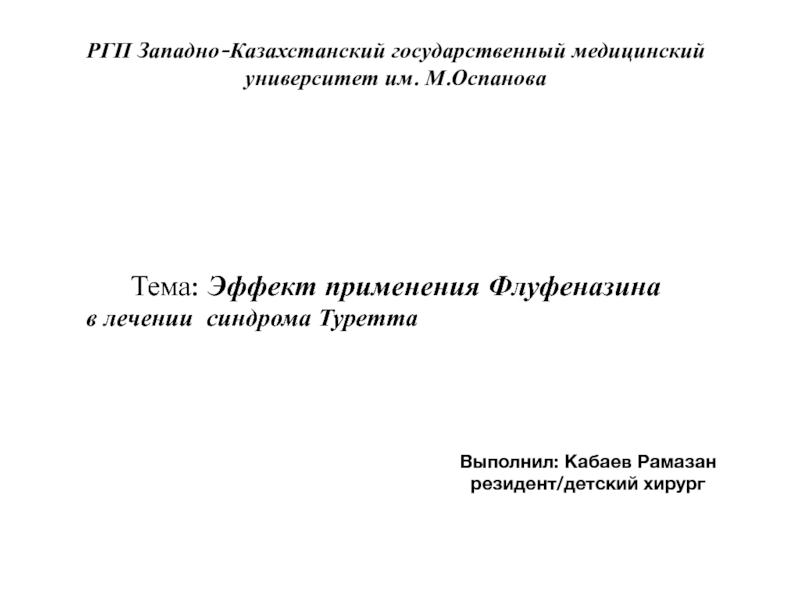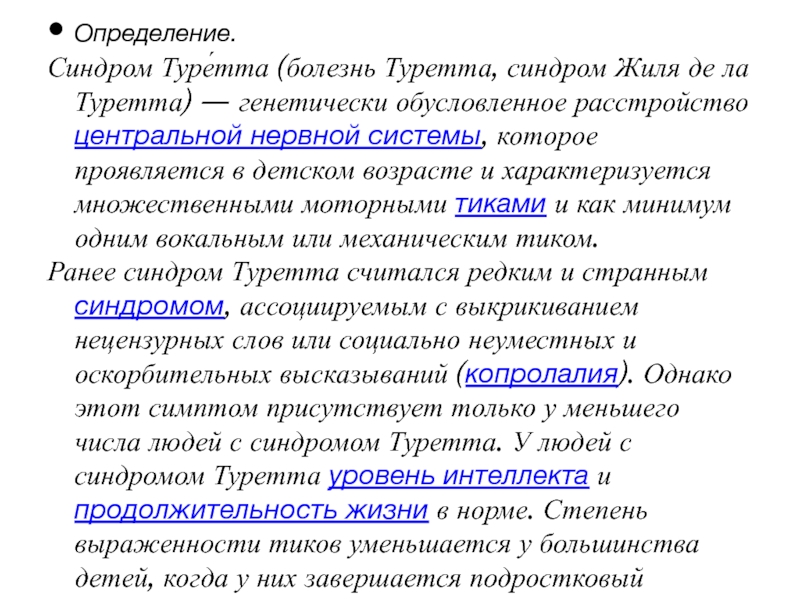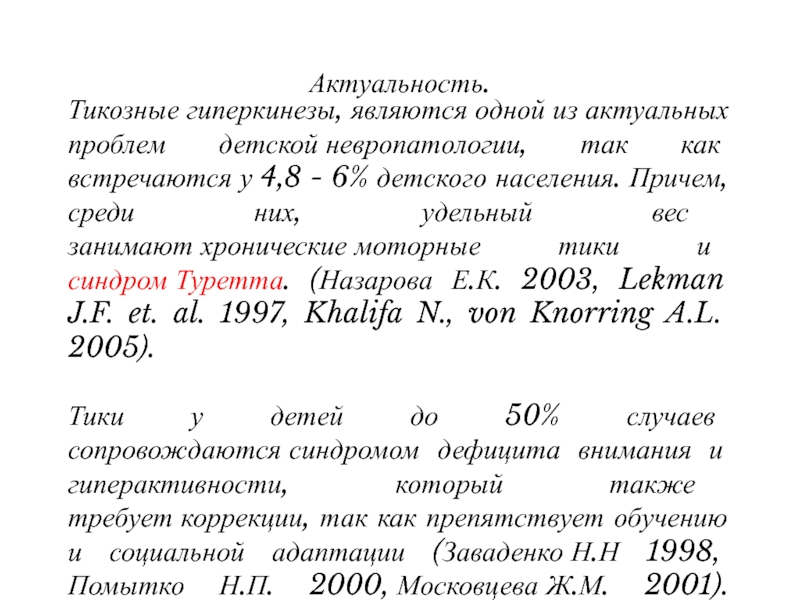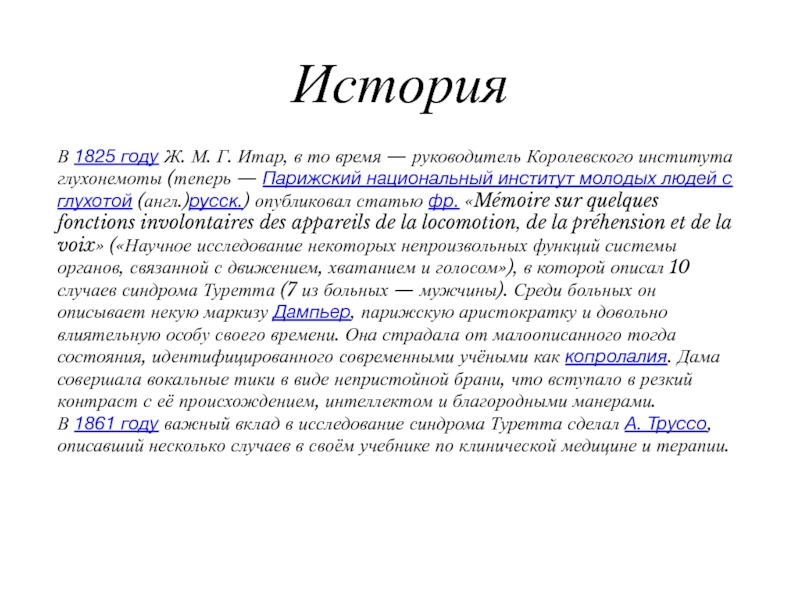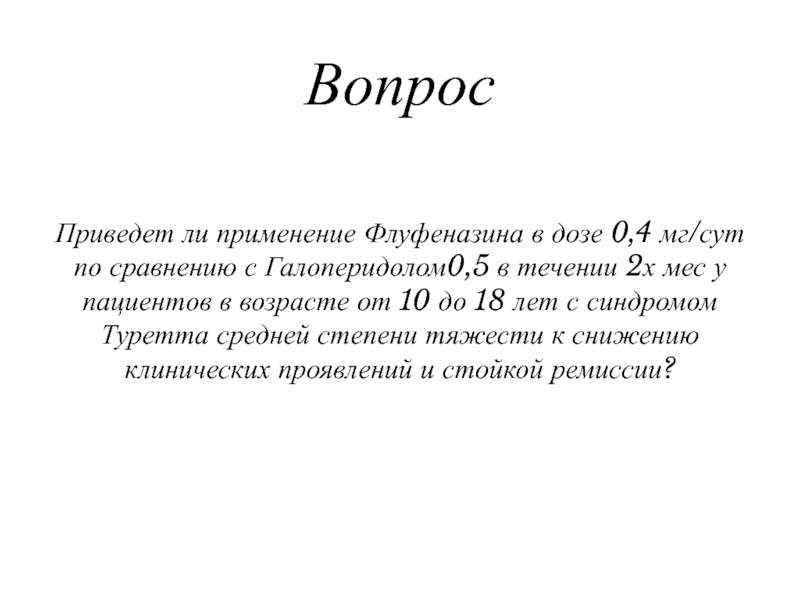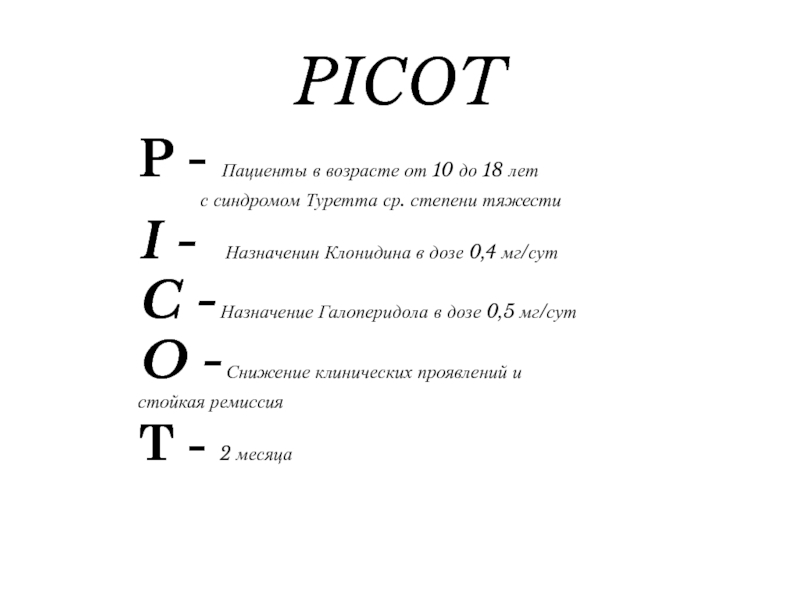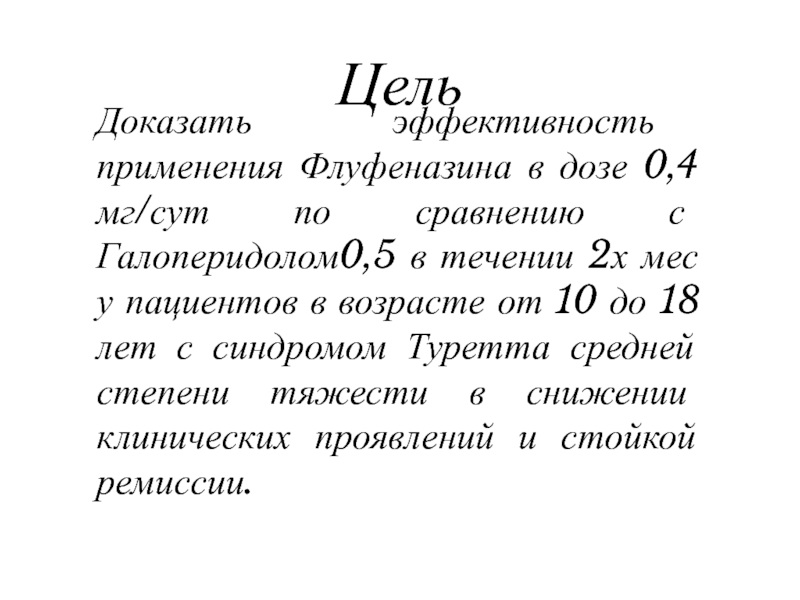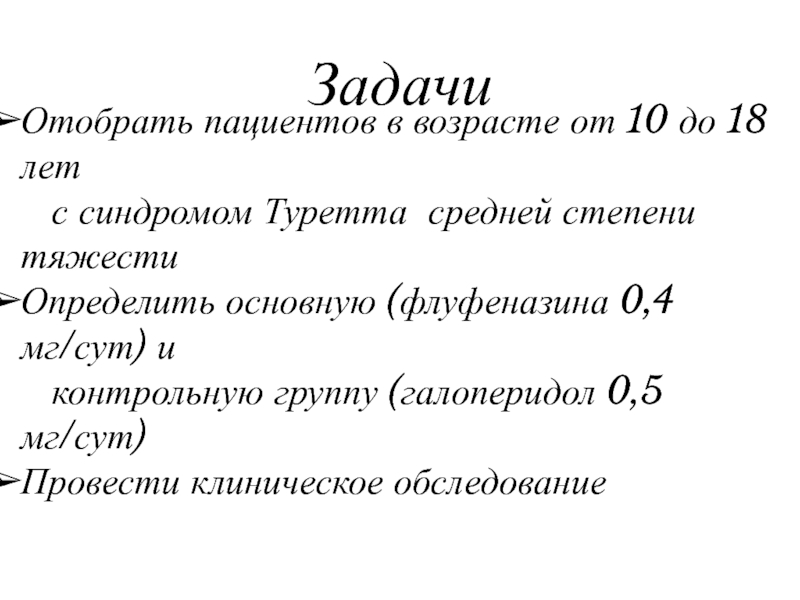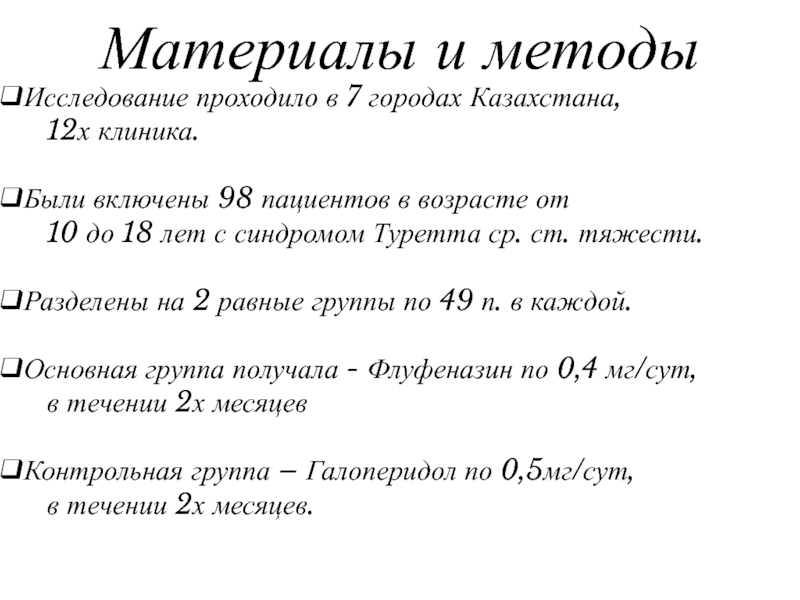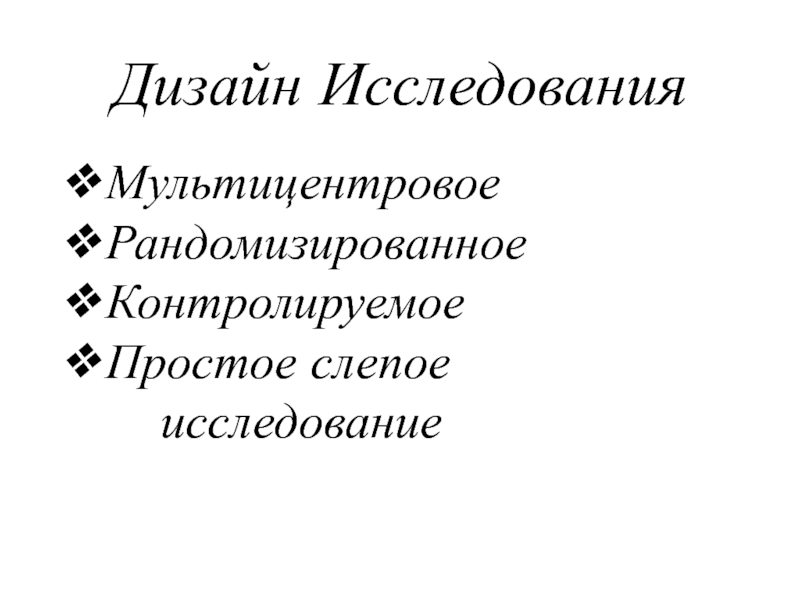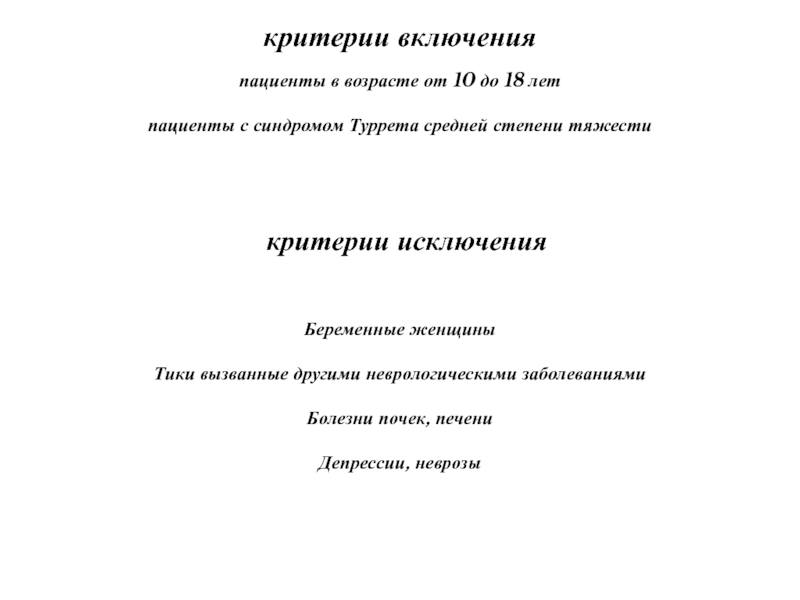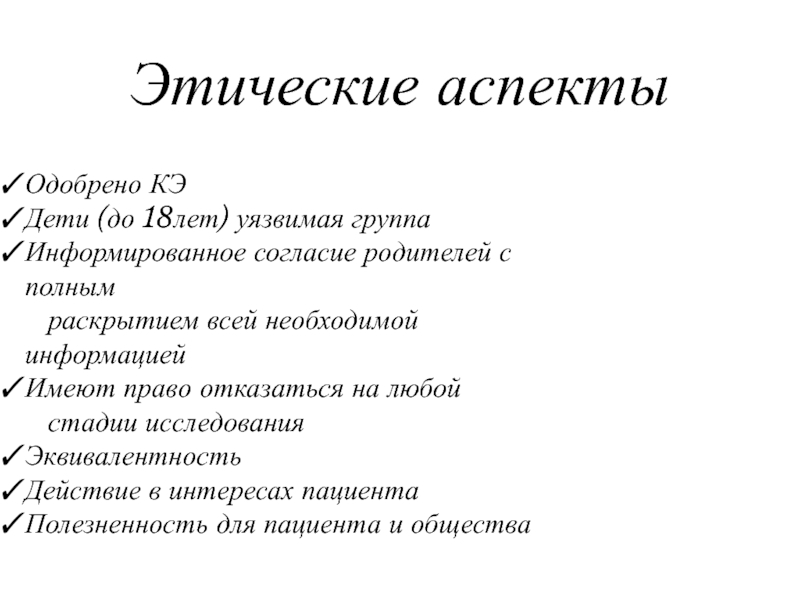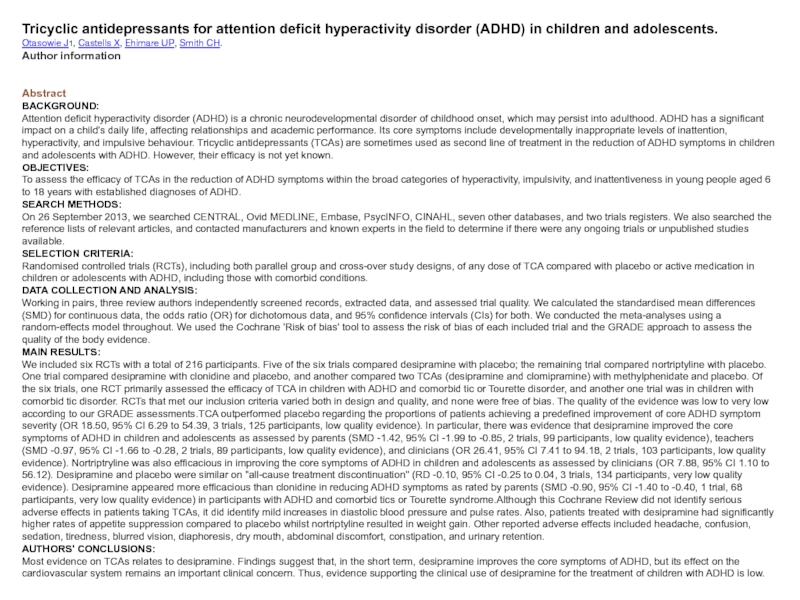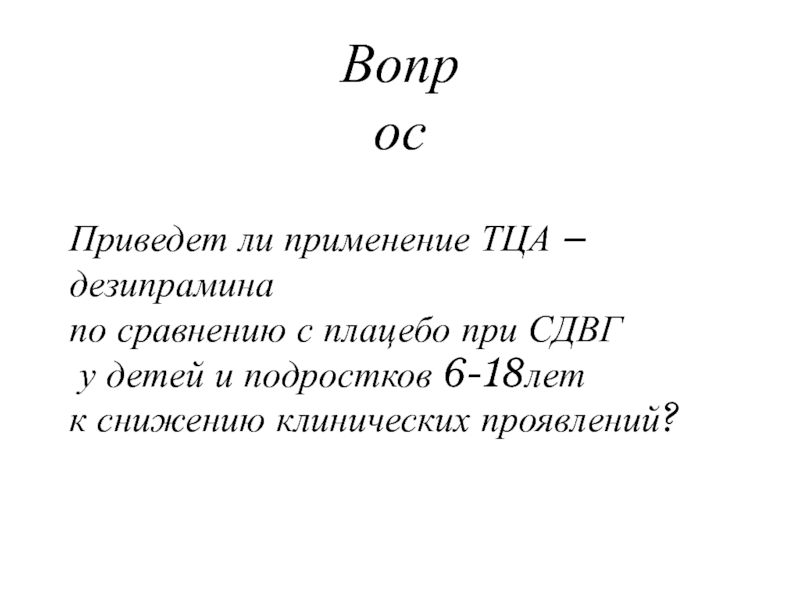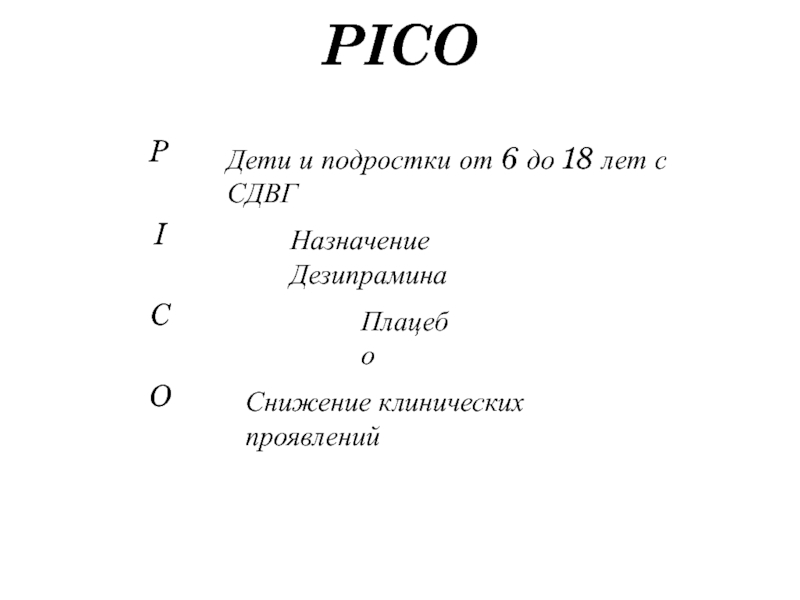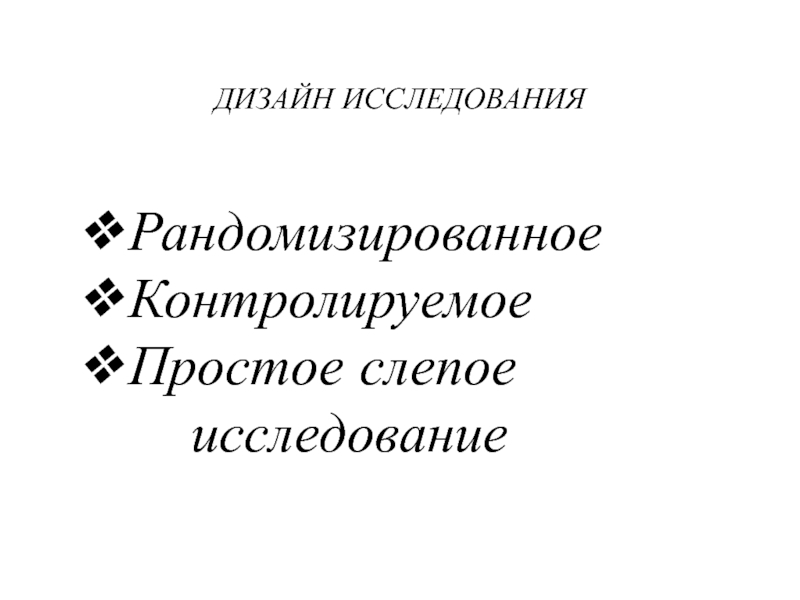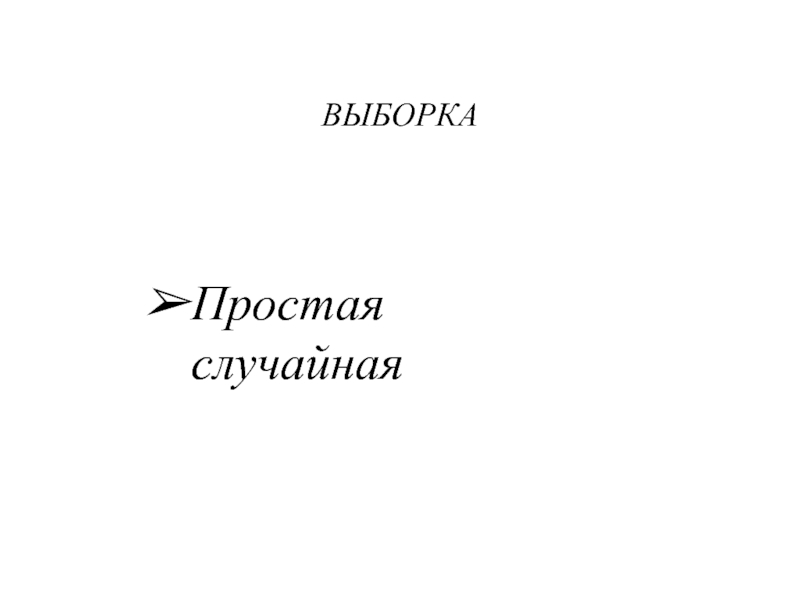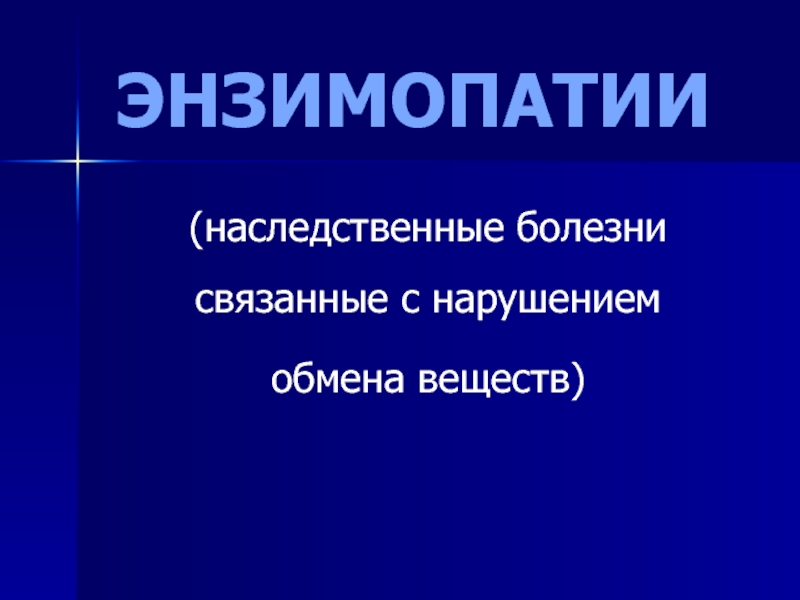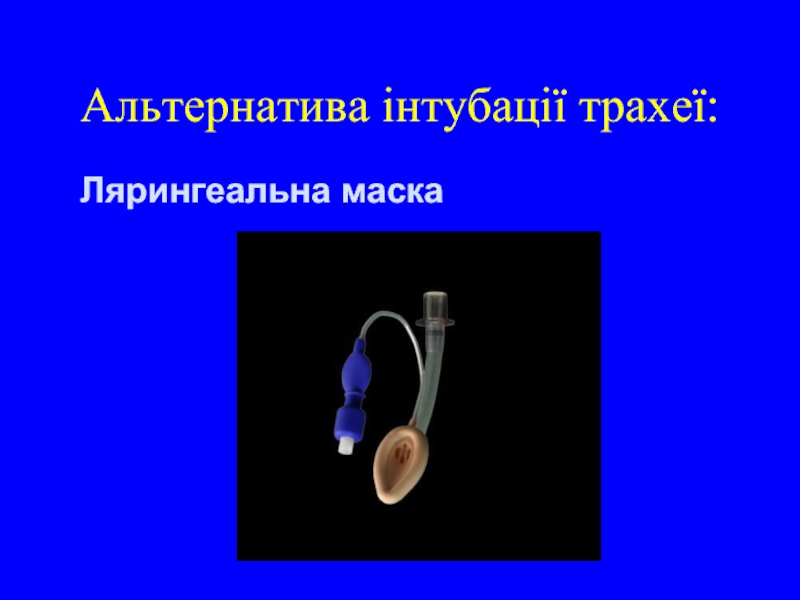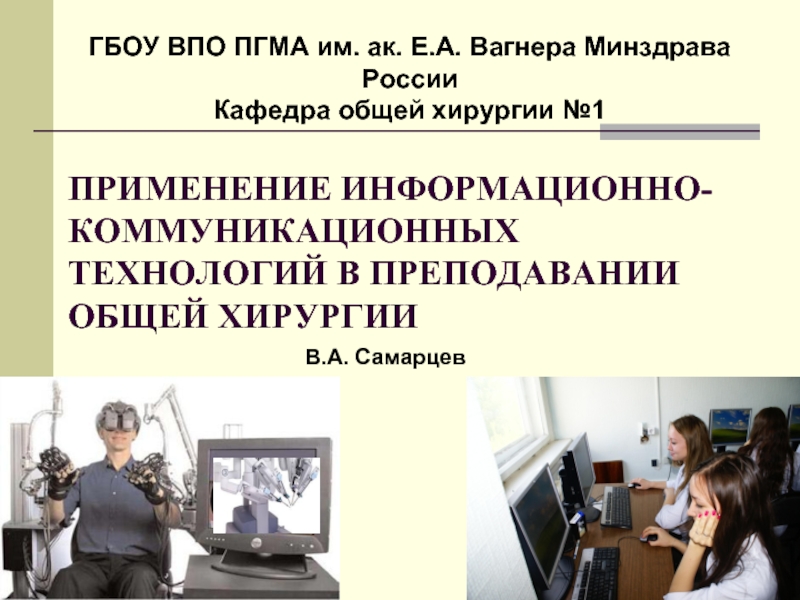Выполнил: Кабаев Рамазан
резидент/детский хирург
- Главная
- Разное
- Дизайн
- Бизнес и предпринимательство
- Аналитика
- Образование
- Развлечения
- Красота и здоровье
- Финансы
- Государство
- Путешествия
- Спорт
- Недвижимость
- Армия
- Графика
- Культурология
- Еда и кулинария
- Лингвистика
- Английский язык
- Астрономия
- Алгебра
- Биология
- География
- Детские презентации
- Информатика
- История
- Литература
- Маркетинг
- Математика
- Медицина
- Менеджмент
- Музыка
- МХК
- Немецкий язык
- ОБЖ
- Обществознание
- Окружающий мир
- Педагогика
- Русский язык
- Технология
- Физика
- Философия
- Химия
- Шаблоны, картинки для презентаций
- Экология
- Экономика
- Юриспруденция
Эффект применения Флуфеназина в лечении синдрома Туретта презентация
Содержание
- 1. Эффект применения Флуфеназина в лечении синдрома Туретта
- 2. Определение. Синдром Туре́тта (болезнь Туретта, синдром Жиля
- 3. Актуальность. Тикозные гиперкинезы, являются одной из актуальных проблем
- 4. История В 1825 году Ж. М. Г. Итар, в
- 5. Вопрос Приведет ли применение Флуфеназина в дозе
- 6. PICOT P - Пациенты в возрасте от
- 7. Цель Доказать эффективность применения Флуфеназина в дозе
- 8. Задачи Отобрать пациентов в возрасте от 10
- 9. Материалы и методы Исследование проходило в 7
- 10. Дизайн Исследования Мультицентровое Рандомизированное Контролируемое Простое слепое исследование
- 11. Выборка простая случайная
- 12. критерии включения пациенты в возрасте от
- 13. Этические аспекты Одобрено КЭ Дети (до 18лет)
- 14. Tricyclic antidepressants for attention deficit hyperactivity
- 15. Приведет ли применение ТЦА – дезипрамина
- 16. PICO Дети и подростки от 6 до
- 17. ДИЗАЙН ИССЛЕДОВАНИЯ Рандомизированное Контролируемое Простое слепое исследование
- 18. ВЫБОРКА Простая случайная
Слайд 1РГП Западно-Казахстанский государственный медицинский университет им. М.Оспанова
Тема: Эффект применения Флуфеназина
в
лечении синдрома Туретта
Слайд 2Определение.
Синдром Туре́тта (болезнь Туретта, синдром Жиля де ла Туретта) — генетически обусловленное
расстройство центральной нервной системы, которое проявляется в детском возрасте и характеризуется множественными моторными тиками и как минимум одним вокальным или механическим тиком.
Ранее синдром Туретта считался редким и странным синдромом, ассоциируемым с выкрикиванием нецензурных слов или социально неуместных и оскорбительных высказываний (копролалия). Однако этот симптом присутствует только у меньшего числа людей с синдромом Туретта. У людей с синдромом Туретта уровень интеллекта и продолжительность жизни в норме. Степень выраженности тиков уменьшается у большинства детей, когда у них завершается подростковый возраст, а тяжёлая степень синдрома Туретта в зрелом возрасте встречается редко. Известные люди с синдромом Туретта встречаются во всех сферах жизни
Ранее синдром Туретта считался редким и странным синдромом, ассоциируемым с выкрикиванием нецензурных слов или социально неуместных и оскорбительных высказываний (копролалия). Однако этот симптом присутствует только у меньшего числа людей с синдромом Туретта. У людей с синдромом Туретта уровень интеллекта и продолжительность жизни в норме. Степень выраженности тиков уменьшается у большинства детей, когда у них завершается подростковый возраст, а тяжёлая степень синдрома Туретта в зрелом возрасте встречается редко. Известные люди с синдромом Туретта встречаются во всех сферах жизни
Слайд 3Актуальность.
Тикозные гиперкинезы, являются одной из актуальных проблем детской невропатологии, так как встречаются у
4,8 - 6% детского населения. Причем, среди них, удельный вес занимают хронические моторные тики и синдром Туретта. (Назарова Е.К. 2003, Lekman J.F. et. al. 1997, Khalifa N., von Knorring A.L. 2005).
Тики у детей до 50% случаев сопровождаются синдромом дефицита внимания и гиперактивности, который также требует коррекции, так как препятствует обучению и социальной адаптации (Заваденко Н.Н 1998, Помытко Н.П. 2000, Московцева Ж.М. 2001).
Тики у детей до 50% случаев сопровождаются синдромом дефицита внимания и гиперактивности, который также требует коррекции, так как препятствует обучению и социальной адаптации (Заваденко Н.Н 1998, Помытко Н.П. 2000, Московцева Ж.М. 2001).
Слайд 4История
В 1825 году Ж. М. Г. Итар, в то время — руководитель Королевского института
глухонемоты (теперь — Парижский национальный институт молодых людей с глухотой (англ.)русск.) опубликовал статью фр. «Mémoire sur quelques fonctions involontaires des appareils de la locomotion, de la préhension et de la voix» («Научное исследование некоторых непроизвольных функций системы органов, связанной с движением, хватанием и голосом»), в которой описал 10 случаев синдрома Туретта (7 из больных — мужчины). Среди больных он описывает некую маркизу Дампьер, парижскую аристократку и довольно влиятельную особу своего времени. Она страдала от малоописанного тогда состояния, идентифицированного современными учёными как копролалия. Дама совершала вокальные тики в виде непристойной брани, что вступало в резкий контраст с её происхождением, интеллектом и благородными манерами.
В 1861 году важный вклад в исследование синдрома Туретта сделал А. Труссо, описавший несколько случаев в своём учебнике по клинической медицине и терапии.
В 1861 году важный вклад в исследование синдрома Туретта сделал А. Труссо, описавший несколько случаев в своём учебнике по клинической медицине и терапии.
Слайд 5Вопрос
Приведет ли применение Флуфеназина в дозе 0,4 мг/сут по сравнению с
Галоперидолом0,5 в течении 2х мес у пациентов в возрасте от 10 до 18 лет с синдромом Туретта средней степени тяжести к снижению клинических проявлений и стойкой ремиссии?
Слайд 6PICOT
P - Пациенты в возрасте от 10 до 18 лет
с синдромом Туретта ср. степени тяжести
I - Назначенин Клонидина в дозе 0,4 мг/сут C - Назначение Галоперидола в дозе 0,5 мг/сут O - Снижение клинических проявлений и
стойкая ремиссия
T - 2 месяца
I - Назначенин Клонидина в дозе 0,4 мг/сут C - Назначение Галоперидола в дозе 0,5 мг/сут O - Снижение клинических проявлений и
стойкая ремиссия
T - 2 месяца
Слайд 7Цель
Доказать эффективность применения Флуфеназина в дозе 0,4 мг/сут по сравнению с
Галоперидолом0,5 в течении 2х мес у пациентов в возрасте от 10 до 18 лет с синдромом Туретта средней степени тяжести в снижении клинических проявлений и стойкой ремиссии.
Слайд 8Задачи
Отобрать пациентов в возрасте от 10 до 18 лет
с
синдромом Туретта средней степени тяжести
Определить основную (флуфеназина 0,4мг/сут) и
контрольную группу (галоперидол 0,5мг/сут)
Провести клиническое обследование
Определить основную (флуфеназина 0,4мг/сут) и
контрольную группу (галоперидол 0,5мг/сут)
Провести клиническое обследование
Слайд 9Материалы и методы
Исследование проходило в 7 городах Казахстана,
12х
клиника.
Были включены 98 пациентов в возрасте от
10 до 18 лет с синдромом Туретта ср. ст. тяжести.
Разделены на 2 равные группы по 49 п. в каждой.
Основная группа получала - Флуфеназин по 0,4 мг/сут,
в течении 2х месяцев
Контрольная группа – Галоперидол по 0,5мг/сут,
в течении 2х месяцев.
Были включены 98 пациентов в возрасте от
10 до 18 лет с синдромом Туретта ср. ст. тяжести.
Разделены на 2 равные группы по 49 п. в каждой.
Основная группа получала - Флуфеназин по 0,4 мг/сут,
в течении 2х месяцев
Контрольная группа – Галоперидол по 0,5мг/сут,
в течении 2х месяцев.
Слайд 10Дизайн Исследования
Мультицентровое
Рандомизированное
Контролируемое
Простое слепое
исследование
Слайд 12критерии включения
пациенты в возрасте от 10 до 18 лет
пациенты с
синдромом Туррета средней степени тяжести
критерии исключения
Беременные женщины
Тики вызванные другими неврологическими заболеваниями
Болезни почек, печени
Депрессии, неврозы
Слайд 13Этические аспекты
Одобрено КЭ
Дети (до 18лет) уязвимая группа
Информированное согласие родителей с полным
раскрытием всей необходимой информацией
Имеют право отказаться на любой
стадии исследования
Эквивалентность
Действие в интересах пациента
Полезненность для пациента и общества
Слайд 14
Tricyclic antidepressants for attention deficit hyperactivity disorder (ADHD) in children and
adolescents.
Otasowie J1, Castells X, Ehimare UP, Smith CH.
Author information
Abstract
BACKGROUND:
Attention deficit hyperactivity disorder (ADHD) is a chronic neurodevelopmental disorder of childhood onset, which may persist into adulthood. ADHD has a significant impact on a child's daily life, affecting relationships and academic performance. Its core symptoms include developmentally inappropriate levels of inattention, hyperactivity, and impulsive behaviour. Tricyclic antidepressants (TCAs) are sometimes used as second line of treatment in the reduction of ADHD symptoms in children and adolescents with ADHD. However, their efficacy is not yet known.
OBJECTIVES:
To assess the efficacy of TCAs in the reduction of ADHD symptoms within the broad categories of hyperactivity, impulsivity, and inattentiveness in young people aged 6 to 18 years with established diagnoses of ADHD.
SEARCH METHODS:
On 26 September 2013, we searched CENTRAL, Ovid MEDLINE, Embase, PsycINFO, CINAHL, seven other databases, and two trials registers. We also searched the reference lists of relevant articles, and contacted manufacturers and known experts in the field to determine if there were any ongoing trials or unpublished studies available.
SELECTION CRITERIA:
Randomised controlled trials (RCTs), including both parallel group and cross-over study designs, of any dose of TCA compared with placebo or active medication in children or adolescents with ADHD, including those with comorbid conditions.
DATA COLLECTION AND ANALYSIS:
Working in pairs, three review authors independently screened records, extracted data, and assessed trial quality. We calculated the standardised mean differences (SMD) for continuous data, the odds ratio (OR) for dichotomous data, and 95% confidence intervals (CIs) for both. We conducted the meta-analyses using a random-effects model throughout. We used the Cochrane 'Risk of bias' tool to assess the risk of bias of each included trial and the GRADE approach to assess the quality of the body evidence.
MAIN RESULTS:
We included six RCTs with a total of 216 participants. Five of the six trials compared desipramine with placebo; the remaining trial compared nortriptyline with placebo. One trial compared desipramine with clonidine and placebo, and another compared two TCAs (desipramine and clomipramine) with methylphenidate and placebo. Of the six trials, one RCT primarily assessed the efficacy of TCA in children with ADHD and comorbid tic or Tourette disorder, and another one trial was in children with comorbid tic disorder. RCTs that met our inclusion criteria varied both in design and quality, and none were free of bias. The quality of the evidence was low to very low according to our GRADE assessments.TCA outperformed placebo regarding the proportions of patients achieving a predefined improvement of core ADHD symptom severity (OR 18.50, 95% CI 6.29 to 54.39, 3 trials, 125 participants, low quality evidence). In particular, there was evidence that desipramine improved the core symptoms of ADHD in children and adolescents as assessed by parents (SMD -1.42, 95% CI -1.99 to -0.85, 2 trials, 99 participants, low quality evidence), teachers (SMD -0.97, 95% CI -1.66 to -0.28, 2 trials, 89 participants, low quality evidence), and clinicians (OR 26.41, 95% CI 7.41 to 94.18, 2 trials, 103 participants, low quality evidence). Nortriptryline was also efficacious in improving the core symptoms of ADHD in children and adolescents as assessed by clinicians (OR 7.88, 95% CI 1.10 to 56.12). Desipramine and placebo were similar on "all-cause treatment discontinuation" (RD -0.10, 95% CI -0.25 to 0.04, 3 trials, 134 participants, very low quality evidence). Desipramine appeared more efficacious than clonidine in reducing ADHD symptoms as rated by parents (SMD -0.90, 95% CI -1.40 to -0.40, 1 trial, 68 participants, very low quality evidence) in participants with ADHD and comorbid tics or Tourette syndrome.Although this Cochrane Review did not identify serious adverse effects in patients taking TCAs, it did identify mild increases in diastolic blood pressure and pulse rates. Also, patients treated with desipramine had significantly higher rates of appetite suppression compared to placebo whilst nortriptyline resulted in weight gain. Other reported adverse effects included headache, confusion, sedation, tiredness, blurred vision, diaphoresis, dry mouth, abdominal discomfort, constipation, and urinary retention.
AUTHORS' CONCLUSIONS:
Most evidence on TCAs relates to desipramine. Findings suggest that, in the short term, desipramine improves the core symptoms of ADHD, but its effect on the cardiovascular system remains an important clinical concern. Thus, evidence supporting the clinical use of desipramine for the treatment of children with ADHD is low.
Otasowie J1, Castells X, Ehimare UP, Smith CH.
Author information
Abstract
BACKGROUND:
Attention deficit hyperactivity disorder (ADHD) is a chronic neurodevelopmental disorder of childhood onset, which may persist into adulthood. ADHD has a significant impact on a child's daily life, affecting relationships and academic performance. Its core symptoms include developmentally inappropriate levels of inattention, hyperactivity, and impulsive behaviour. Tricyclic antidepressants (TCAs) are sometimes used as second line of treatment in the reduction of ADHD symptoms in children and adolescents with ADHD. However, their efficacy is not yet known.
OBJECTIVES:
To assess the efficacy of TCAs in the reduction of ADHD symptoms within the broad categories of hyperactivity, impulsivity, and inattentiveness in young people aged 6 to 18 years with established diagnoses of ADHD.
SEARCH METHODS:
On 26 September 2013, we searched CENTRAL, Ovid MEDLINE, Embase, PsycINFO, CINAHL, seven other databases, and two trials registers. We also searched the reference lists of relevant articles, and contacted manufacturers and known experts in the field to determine if there were any ongoing trials or unpublished studies available.
SELECTION CRITERIA:
Randomised controlled trials (RCTs), including both parallel group and cross-over study designs, of any dose of TCA compared with placebo or active medication in children or adolescents with ADHD, including those with comorbid conditions.
DATA COLLECTION AND ANALYSIS:
Working in pairs, three review authors independently screened records, extracted data, and assessed trial quality. We calculated the standardised mean differences (SMD) for continuous data, the odds ratio (OR) for dichotomous data, and 95% confidence intervals (CIs) for both. We conducted the meta-analyses using a random-effects model throughout. We used the Cochrane 'Risk of bias' tool to assess the risk of bias of each included trial and the GRADE approach to assess the quality of the body evidence.
MAIN RESULTS:
We included six RCTs with a total of 216 participants. Five of the six trials compared desipramine with placebo; the remaining trial compared nortriptyline with placebo. One trial compared desipramine with clonidine and placebo, and another compared two TCAs (desipramine and clomipramine) with methylphenidate and placebo. Of the six trials, one RCT primarily assessed the efficacy of TCA in children with ADHD and comorbid tic or Tourette disorder, and another one trial was in children with comorbid tic disorder. RCTs that met our inclusion criteria varied both in design and quality, and none were free of bias. The quality of the evidence was low to very low according to our GRADE assessments.TCA outperformed placebo regarding the proportions of patients achieving a predefined improvement of core ADHD symptom severity (OR 18.50, 95% CI 6.29 to 54.39, 3 trials, 125 participants, low quality evidence). In particular, there was evidence that desipramine improved the core symptoms of ADHD in children and adolescents as assessed by parents (SMD -1.42, 95% CI -1.99 to -0.85, 2 trials, 99 participants, low quality evidence), teachers (SMD -0.97, 95% CI -1.66 to -0.28, 2 trials, 89 participants, low quality evidence), and clinicians (OR 26.41, 95% CI 7.41 to 94.18, 2 trials, 103 participants, low quality evidence). Nortriptryline was also efficacious in improving the core symptoms of ADHD in children and adolescents as assessed by clinicians (OR 7.88, 95% CI 1.10 to 56.12). Desipramine and placebo were similar on "all-cause treatment discontinuation" (RD -0.10, 95% CI -0.25 to 0.04, 3 trials, 134 participants, very low quality evidence). Desipramine appeared more efficacious than clonidine in reducing ADHD symptoms as rated by parents (SMD -0.90, 95% CI -1.40 to -0.40, 1 trial, 68 participants, very low quality evidence) in participants with ADHD and comorbid tics or Tourette syndrome.Although this Cochrane Review did not identify serious adverse effects in patients taking TCAs, it did identify mild increases in diastolic blood pressure and pulse rates. Also, patients treated with desipramine had significantly higher rates of appetite suppression compared to placebo whilst nortriptyline resulted in weight gain. Other reported adverse effects included headache, confusion, sedation, tiredness, blurred vision, diaphoresis, dry mouth, abdominal discomfort, constipation, and urinary retention.
AUTHORS' CONCLUSIONS:
Most evidence on TCAs relates to desipramine. Findings suggest that, in the short term, desipramine improves the core symptoms of ADHD, but its effect on the cardiovascular system remains an important clinical concern. Thus, evidence supporting the clinical use of desipramine for the treatment of children with ADHD is low.
Слайд 15Приведет ли применение ТЦА – дезипрамина
по сравнению с плацебо при
СДВГ
у детей и подростков 6-18лет
к снижению клинических проявлений?
у детей и подростков 6-18лет
к снижению клинических проявлений?
Вопрос
Слайд 16PICO
Дети и подростки от 6 до 18 лет с СДВГ
Назначение Дезипрамина
Снижение
клинических проявлений
Плацебо
P
I
C
O
